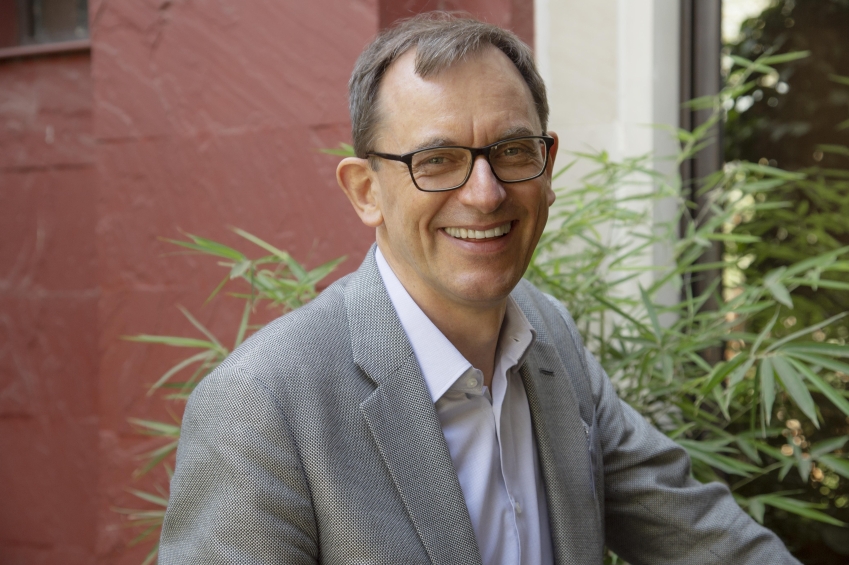News

Interview with Dr Andreas Rogge, BAM
Dr.-Ing Andreas Rogge is Head of the Department of Safety of Structures at Bundesanstalt für Materialforschung und -prüfung (BAM) in Berlin, Germany. BAM has been a RILEM corporate member since 1993. This interview highlights the mutual benefits for both organizations, RILEM and BAM, after this long-term collaboration

RIM: Thank you for your time and for this interview, Dr Rogge. Correct me if I am wrong, but I have the feeling I am talking to a super boss of BAM as you are the Head of a Department (editor’s note: Department 7 “Safety of Structures”) which have 7 subdivisions. You are managing lots of people! Am I correct?
Dr Rogge: Yes! But I am not a super boss. There is a super boss above me!
RIM: There might be another super boss above you, but still… you have to manage and coordinate many people.
Dr Rogge: Yes! 160 or something like that.
RIM: The reason for this interview is behind the 150th anniversary of BAM and the 75th Anniversary of RILEM. These two institutions have had a very long collaboration as BAM became RILEM member in 1993. If I understand well, you joined BAM in 2007 and since then there are 23 RILEM staff member from BAM. Are you behind this high number of people in BAM working with RILEM? This cannot be a coincidence!
Dr Rogge: No, it is not. I think there are 15 to 17 people from my department amongst those 23 RILEM members. The others might be from the Department of “Non-Destructive Testing”. It is a different department but it is also working on structural engineering.
RIM: I see. How does it work? Do you invite your colleagues to join RILEM? I am just wondering why you join RILEM and suddenly we have an exponential increase in the number of BAM members.
Dr Rogge: I didn’t invite anyone to join RILEM, to be honest. I like RILEM and I found it is a good platform to cooperate scientifically but the interest comes from my colleagues. I just support it. The question is always “Am I allowed to go there?” as it is a matter of travelling time, working time, and so on, so it is a matter of giving support to go to a RILEM TC meeting. I strongly support it as I think it is a very good platform to exchange results, to come together for a discussion. I see the results from my colleagues, what they are publishing, what is the outcome of their work. I can just tell everyone it is a good idea to go there and present your results. But I do not urge them to do so!
RIM: No pressure then! You know that members of a RILEM TC donate their time as they work on a voluntary base. To find a boss like yourself that supports their participation and activities in RILEM is absolutely great!
Dr Rogge: Before joining BAM in 2007, I was not so much involved in RILEM because I had a completely different job in an engineering company. I just found it is helpful…
RIM: How did you find it out?
Dr Rogge: I talked to my team members, about their scientific work and what they were doing and producing and their collaboration with other people. I found out that the name “RILEM” was mentioned very often, as they were talking about a RILEM TC or about someone that was active within RILEM. On the other hand, I have always seen how useful RILEM Publications are. When I started with my doctorate thesis, I learned everything about concrete testing from a huge red and grey book by RILEM with all technical recommendations. And unlike standards where you learn what to do, the recommendations and the additional information taught me why to do so. Nowadays, it is not just a matter of contributing to something bigger like RILEM but also gaining knowledge. It is a mutual benefit. At the moment, I recommend my people and my team members to go to RILEM and to exchange information on that platform as it is the most convenient one for everyone. At BAM we also work inside standardization committees but there you have other levels of discussion because you also have to look at industry interest. RILEM is a step earlier when you try to find the common position based on scientific findings without being influenced by market policies. For us, this is perfect. At BAM we have the strategy of working on every level of scientific findings or let’s say technology-readiness level; we have some basic research in some areas, but also applied research, technology transfer, we also work on standardization. So, we have the full range of scientific work. At a certain point RILEM is a good committee to come together to certain scientific viewpoints with other parties. When you have found your own model, your own idea, RILEM is the platform where you can share this with others. This is perfect, especially for concrete-related research.
RIM: I read a publication from BAM, released for its 150th Anniversary about “neutral buildings” (editor’s note, it was “Sustainable building materials Researching climate-neutral building materials”). RILEM is also very much focused on environmental issues. On this matter, I do not know if you heard about the initiative called GLOBE.
Dr Rogge: Yes, I did and we keep on implementing this idea in our regular work.
RIM: I see this as a common ground between RILEM and BAM, because I understand that also BAM is committed to promote research towards more sustainable materials and construction practices.
Dr Rogge: We are 150-year-old now. We have a long-term strategy that is called “safety in technology and chemistry” and under this umbrella we try to focus on certain topics that are societally interesting at the moment and will be the future. One of these is, of course, sustainable construction and sustainable concrete is one of the focus in our “building materials” division. This is also why we are so active in Africa… do you know my colleague Wolfram Schmidt?
RIM: Of course, I do. He is very active in RILEM.
Dr Rogge: Yes, he keeps himself very busy as he has 5 ideas every day and he wants to develop them all. It is part of my job to focus on what he is doing and make it possible. He came with this idea “let us try to collaborate with our African partners for a change”. We decided that we could make it possible somehow. It was a good idea!
RIM: Yes, it is working very well! I have two more questions. One: I would like to know your experience during this COVID period, or, in other words, how has BAM coped with smart working and social distancing? Two: what do you think is happening in the next future in terms of collaboration between RILEM and BAM and how this pandemic will change the way we do research?
Dr Rogge: During the pandemic, in BAM we had a “luxury” position so to say. We are government institute, so this means not no one in BAM had issues with losing his/her job.
RIM: Did you have to stop any laboratory activity?
Dr Rogge: Yes, of course. At the beginning we tried to reduce presence work as far as possible so we focused on what could be done by working from home. Absolutely necessary lab work is now possible but we try to reduce the number of people coming to the office and we implement all possible sanitary measures. It has been a major change in the way people work, of course. We wrote publications, we applied for grant opportunities and we reacted on calls. Now we have 50% of people working from home and the rest coming to the office. This allows as to keep the distance but also to let the basic work go on.
RIM: Do you think it is going to stay like this even after the pandemic?
Dr Rogge: Lots of my colleagues really like to come to the building. They really like the exchange with others. We have many online meetings, very well organised, it is good. Nevertheless, web meetings always have a focus, a special topic, and this random talk along the corridors is missing a bit. So maybe there will be a compromise between now and the pre-COVID situation. You will not get rid of smart-working. We have been doing it for one year and we see that is working.
RIM: And what about the collaboration between RILEM and BAM?
Dr Rogge: We will definitively continue with the collaboration on the “construction materials” research, especially more sustainable and alternative binders. I also see there will be more web meetings than before. In the past we encouraged to have meetings at BAM, to show what we do here, to also foster in-person meetings and exchange of ideas. This is something that I like and I will keep fostering when this pandemic will be over. Regarding the research topics, I understand there is a new committee on bituminous binders (editor’s note: RILEM Technical Committee FBB: Fingerprinting bituminous binders using physico-chemical analysis). We have had a group working for a long time on this topic so this is again perfect for us. As I said, it is a very good cooperation between RILEM and BAM.
RIM: And for RILEM it is great to have BAM staff on board to contribute to the advancement of the knowledge about building materials. Thank you again for your time today, Dr Rogge!














No comment
Log in to post comment. Log in.